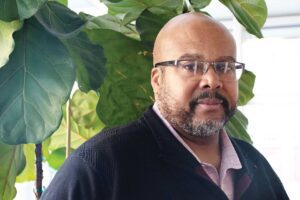For local organizations, addressing climate crisis means new opportunities for Black and brown communities

The energy thrummed around the conference table at Cambridge College, as 13 high school students called out rapid calculations around power and how it’s transferred.
Boisterous calls of “joules,” “kilowatts” and “megawatt-hours” chased numbers around the room as they prepared for a quiz, part of a paid summer learning initiative focused on green energy jobs, run by the Boston professionals’ chapter of the National Society of Black Engineers.
The students, all from environmental justice communities in and around Boston, were part of the Inspire STEM Youth Workforce Development Program’s inaugural class, a new effort to expand the horizons for youth of color and expose them to the opportunities in so-called “green collar” jobs.
“They’re really learning the gamut of what the field can be,” said Alexis Smith-Attuquayefio, president of the NSBE Boston professionals’ chapter. “The goal is to expose them to as much as possible so that they can start to make a decision as to how they want to interact with the clean energy future.”
The six-week course covers the basics of the energy economy and includes externships — projects partnered with external companies to give the class hands-on experience, like designing an energy transfer system from a windmill to a transfer station or doing an energy audit of a community center — all while paying the students to be there. Each student receives a $3,000 stipend.
“The idea is to make them active stakeholders in the clean energy industry. … We’re offering them a stipend as well, so not only do they get some learning about the opportunities in clean energy — and it’s a lot of opportunity in clean energy — they also are compensated for their time,” said Sade Mabawonku, program coordinator for Inspire STEM.
The NSBE program is one of a growing number of efforts to address equity and access to jobs in the climate technology industry, especially as the field sees new growth as, nationwide, efforts look to address the climate crisis.

Kerry Bowie, executive director of Browning the Green Space, a local nonprofit focused on advancing diversity, equity and inclusion in the climate technology sector. BANNER PHOTO
It’s an area that has started to see movement, but has room to grow, said Kerry Bowie, executive director of Browning the Green Space, a local nonprofit focused on advancing diversity, equity and inclusion in the climate technology sector.
“Generally, I think we’re doing stuff, but I also think there’s a lot more that we can be doing,” Bowie said.
Central to the effort is a push to expand employment opportunities in the field, like through Inspire STEM.
That focus on connecting people to jobs is an important step, Bowie said, even if it’s not as “sexy” as work around things like developing new climate technology.
“People like to hear about that stuff, but what’s even cooler, and I think is the low-hanging fruit, is training returning citizens to do HVAC and buttoning up houses in Roxbury and Dorchester,” he said. “That’s the stuff we need to be doing and doing in in droves”
The state, too, is pushing efforts to increase worker diversity. In May, during a visit to the Vatican for a climate conference, Governor Maura Healey announced a Climate Careers Fund as another avenue to grow.
That effort aims to reach $10 million in funding to add resources for public education and workforce programs to help connect Massachusetts residents to so-called “green collar” jobs they may not have otherwise had access to.
“We’ve got an opportunity to close the wealth gap and decrease the energy burden while we do it,” Bowie said. “It’s this whole concept that we’re only as strong as our as our weakest links, so why can’t we support everybody when we do this?”
A change from business-as-usual, as the still relatively new field develops is a priority, said Salvador Pina, dean of workforce and business development at Roxbury Community College.
“Oftentimes in our history, when new technologies emerge and new opportunities emerge, folks in poverty and people of color are usually sort of afterthoughts in that,” he said. “As a predominantly Black institution, we’re trying to change that. We want to make sure that those folks get in on the ground floor; that they have the opportunity to grow with the industry.”
Roxbury Community College, alongside Frankin Cummings Institute of Technology and Holyoke Community College, was one of the first recipients of funding through the Climate Careers Fund, receiving $1.3 million from the state to support programing to train students in building energy auditing.
That four-week program, which the school aims to officially launch with its first cohort in October, will provide students at the college with certifications related to energy audits in buildings.
“There’s a lot going on, and, you know, in with this issue, got in climate change, right? You know, there’s solar power, wind power, right? There’s a whole number of areas that you can get into. We decided we wanted to stay in the lane that has to do with buildings, because we think that’s the biggest impact,” Pina said.
As the city and state look to address carbon emissions, large buildings are ripe for reductions. According to city data, in 2021 commercial, industrial and large residential buildings accounted for about 47% of emissions in Boston.
It’s a new area of education, without much of a degree set-up already established. Pina said the college is working on putting together an associate degree program in building automations systems technology, which he called a “terminal degree.”
That means it would not be intended to serve as a potential jumping off point to a four-year degree in the same subject area. Instead, Pina described the degree as an entry point into a job market with a wide range of possibilities.
Rather than using the associate degree as one step in a higher-education journey, he said it would allow students from communities like Roxbury to enter the green technology economy and then expand their skills and focus to other fields in the industry.
“We’re trying to move people as quickly as we can into the industry, so that they can start to experience the industry,” Pina said. “Then, from that position, they might go, ‘Oh, I really like being an HVAC tech. I want to do that,’ or ‘I want to learn how to install heat pumps.’”
That kind of education can have a big impact on not just the students who go through programs like the one at Roxbury Community College, but also the communities they live in, he said.
“This is about wealth creation,” Pina said. “I think it’s important to understand the work … is really about creating wealth for families, then creating wealth for communities, right? When that happens, communities change for the better.”
Beyond the workforce, as the city and state pursue climate goals, intentionally engaging with Black-owned businesses will also be key, said Shonté Davidson, whose company Better Together Brain Trust was tapped by the city as part of a pilot program installing municipal-owned curbside electric vehicle chargers.
Supplier diversity goals — benchmarks around how many businesses from diverse backgrounds that larger entities like the city or state contract with — are key to sharing that success, said Nicole Obi president and CEO of the Black Economic Council of Massachusetts.
“In the past, I think we’ve struggled to realize the promise of supplier diversity goals, but here there’s a great opportunity, because the demand for skills in this burgeoning industry sector are so much that I think it opens up a willingness to be more creative, more open, more inclusive in where those skills are going to come from,” Obi said.
Obi’s organization, BECMA, runs a number of programs that aim to connect the council’s member companies to contracting opportunities, including some, like an electric vehicle kickstarter program, focused on green technologies.
To expand supplier opportunities, Davidson said she would like to see more diversity goals that are “cascading” — meaning they are broken down into to set subgoals for example establishing an aim for businesses of color separate from women-owned businesses, separate from veteran-owned businesses.
Davidson, who previously worked as a supplier diversity program manager, said that without cascading diversity goals, she has seen many opportunities go to women-owned businesses and veteran-owned businesses, leaving those owned by people of color out of the mix. She said she would also want to see clear communication around what the goals are, how they’re being achieved, and who is benefiting.
“There needs to be a cascading supply diversity goal, so that people like me — Blacks, Asian, Latino, veteran, or disabled business owners — can actually have a pot of money to go after,” Davidson said. “But it needs to be paired with some accountability and some transparency.”
It will also require changing patterns of the barriers that currently exist in supplier diversity goals, Obi said.
“We’re interested in making sure that we’re not lifting and shifting some of the existing challenges that we face in supplier diversity into a new sector,” she said, pointing to barriers for small and micro businesses that may struggle to tackle large initiatives and projects on their own.
Obi said BECMA has been working on reducing the vulnerabilities small businesses may have and looking to intentionally consider how to scale their work in the climate space.
Efforts in bringing more workers from communities of color into green collar jobs could also be an important piece of helping the state meet its climate goals, like reducing greenhouse gas emissions by 50% by 2030 or reaching net-zero emissions by 2050.
“The existential threat inherent in the climate crisis means we need all hands on deck and we really just can’t afford to have Black and brown communities on the sidelines,” Obi said.
The Massachusetts Clean Energy Center, in its 2023 Clean Energy Workforce Needs Assessment, estimated that about 30,000 new full-time workers will be needed as the state pursues a clean energy transition. In a letter from May, the policy team at BECMA called Black firms and workers “critical” to growing those worker numbers.
More people of color in green collar jobs could also help uptake of some of the technologies needed to reach those goals, especially in communities of color, Obi said.
Mass Save’s three-year plan for 2022 through 2024, identified a lack of trust as one barrier to customer participation. Increased representation and participation could be an important step in rolling out climate solutions more widely, Obi said.
“I do think that awareness and trust are very important to adoption across all communities, in particular to environmental justice communities, where too many times they haven’t been helped, but they’ve been hurt by the same people that are now asking them to open the doors and let them in,” Obi said.
And through efforts like her organization’s Inspire STEM program, Smith-Attuquayefio said exposing new students from environmental justice communities could bring out better solutions to the climate tech landscape.
Those 13 students, studying how to calculate energy and power, could be set up to be the next inventor or company leader to bring about a new solution to a problem that hit their communities close to home, she said.
“I’m a believer that its harder to solve problems if you have no experience with the challenge,” Smith-Attuquayefio said. “If we think about these communities and what their unique needs would be with respect to the future of clean energy, the best people to know are the ones who grew up in there.”






